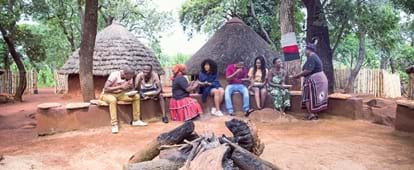By creating an account, I agree to the
Terms of service and Privacy policy
Choose your country and language:
Africa
Americas
Asia Pacific
Europe
WWe cannot begin a conversation about South African food without giving a special mention to pap. Pap is a kind of porridge made from maize meal and can be cooked to be runny, soft or stiff. Any time of the day is a great time to enjoy pap - breakfast, lunch or supper. It is a staple in many homes, mainly thanks to its cost and versatility. Pap can be enjoyed with sugar and milk for breakfast or meat and vegetables for lunch and supper; it can even be watered down to make a tasty drink called Mageu. There are also many intricate ways to prepare pap, depending on the tribe, for example, Xhosa, Venda, Zulu or Sepedi.
Celebrations and occasions such as funerals are very important in telling the food story of South Africa. These occasions really are a group effort - everyone in the community has a role to play in order for the event to be executed. In the case of a wedding, a white flag is hoisted on the gate of the family home weeks before the date to alert passersby of the upcoming nuptials.

TThe events are usually on a weekend. Women arrive at the family’s home the week of the wedding, singing and ululating to express their shared joy at the occasion. On their heads they carry vegetables, cooldrinks and wood to be used to cook the feast. The wood and food pile up, and more and more families bring their contributions. The women usually belong to a special “club” called a society or stokvel. These women are a collective that gather to help each other in times of need and have monthly monetary contributions and meetings. These are the same women who wake up at the crack of dawn on the day of the occasion to prepare the feast for everyone to enjoy.
A cow is slaughtered by the men in the community; a trusted uncle is entrusted with slitting the throat while the men hold the animal down. A hole is dug in the ground to collect some of the blood to appease the ancestors who will bless the union of the families, and some is collected to be cooked on an open flame until it simmers into a thickened mixture called bobete, a brown paste similar to liver paste that can be served with pap.
Skilled men then skin the carcass and the skin is given to the couple. The offal is then cleaned by the young men before they cook it and the rest of the meat given to the women to cook for everyone. Most weddings have a very standard menu of starch such as rice, pap and samp (dried corn kernels that have been ground and chopped), vegetables such as beetroot, butternut and salads, and meats like beef and chicken.
The women would have made umqombothi, the traditional beer that is also used to communicate to the ancestors. There is always an aunt who makes it best and she is the one entrusted with the brewing. Some of the beer is given to the in-laws as a gift to take home to those that could not attend the nuptials. A place like Shakaland in northern Kwazulu-Natal goes a long way in recreating a similar experience in a traditional and authentic Zulu experience as it was in days gone by.

OOnce the cooking is done, the food is lined up buffet-style and the women dish up for the queued guests. A similar procedure is followed for a funeral. Both occasions technically don’t have a guestlist and everyone is welcome to attend if they wish.
Sunday is another great occasion in South Africa, a day most start at a church, after which they get to enjoy their beloved Sunday lunch. It’s also known as seven colours because on Sundays families usually go all out and are extravagant, and prepare dishes they don’t usually have during weekday. A great Sunday lunch must have at least seven colours: the yellow of savoury rice, the white of potato salad, the purple of beetroot, the orange of butternut mash, the green of creamed spinach, the brown of the meat and the red of the chakalaka (vegetable relish).
If you want to experience a traditional seven-colours meal then a visit to Wandie's Place in Vilakazi Street in Soweto is in order, with a one-of-a-kind homely experience.
Food is very important to the heritage and traditions across the cultures and religions in South Africa. It is used to celebrate, to mourn and even communicate with a higher power.


AAbout the author
Mogau Seshoene founded The Lazy Makoti in 2014 after leaving the corporate world to pursue her love for food and the preservation of South African cuisine and heritage. What began as lessons for a friend who was due to be married, and was nervous about being labelled “The Lazy Makoti” (the lazy daughter in law) as she couldn’t cook, has now evolved into a business. She has since made The M&G top 200 Young SA list, and hosted a season of a TV cooking show “Cooks For Life” where she demonstrated easier and healthier ways to prepare African and South African food.
In 2016 she obtained a diploma in culinary arts from The Culinary Training and Innovation Academy in Centurion and completed her training under Chef Werner at the Saxon Hotel in Johannesburg. In the same year, she took part in The Mandela Washington Fellowship at the University of Wisconsin Stout in the US. Through The Lazy Makoti, she hosts a series of cooking classes targeted at young, modern Afropolitans who have a keen interest in learning to navigate the kitchen with ease and flair. Mogau is also one of Brand SA Play your Part ambassadors, and in 2016 made the Forbes 30 under 30 list.
Related articles

